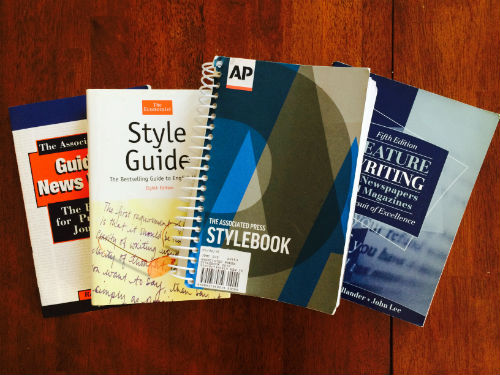Beyond the lead or nut graph, my freshman news writing students at the UNC Chapel Hill School of Media and Communication last semester struggled most with Associated Press style rules. Some worried about the sheer number, while others despaired when to apply them. To these valid concerns, I responded you’ll know your beat, and within your beat you’ll quickly learn the AP style rules required. Within that theme, business reporters constantly encounter recurring AP style rules; and this two-part blog series hopes to tackle some of the trickier rules.
Write the state out in full
Business reporters have long known to write the city name out in full and abbreviate the state immediately afterwards. About two years ago, the Associated Press changed that rule and asked writers to write out the city and state in full as well. Only in datelines, lists and captions does the old rule apply.
Small businessman vs. small-business man
The stylebook says to hyphenate. So, write: small-business man and small-business woman to avoid implying the professional lacks height.
Moneymaking business
Moneymaking business sounds like a compound modifier. Therefore, you’d think “moneymaking” requires a hyphen. Not so. Reason being, moneymaking is a closed compound, like Superman and bookstore.
Use numerals in headlines, even under 10
So in this story published on April 1, the headline read “2 New York siblings are among the dead in Brussels attack.” The first opening sentence read, “Two New York siblings…”
Avoid periods in US in headlines
AP’s guidebook asks us to insert periods in U.S., within the copy, but not within headlines. So, the headline for this article becomes “Argentina Congress Approves Deal to End Debt Standoff in US.” Later in the article, reporters cite the U.S. District Court Judge repeatedly ruled against Argentina. USA takes no periods either, even in copy.
Corporation
My 2015 stylebook reads: “Abbreviate corporation as Corp. when a company or government agency uses the word at the end of its name.” For example, the Federal Deposit Insurance Corp. Then, spell out Corporation when it occurs elsewhere in the name. So, the Corporation for Public Broadcasting. Otherwise, we’re meant to spell out and use lowercase for corporation whenever it stands alone.
Cost of living
The phrase defines the amount of money needed to pay taxes and buy the goods and services deemed necessary to make up a given standard of living. That’s the Associated Press Stylebook’s verbatim definition. The rules follow: don’t confuse the term as an acronym for the U.S. Consumer Price Index which doesn’t take taxes into account and measures only price changes. Also, hyphenate only when you’re using the term as a compound modifier. For example, New Zealand’s cost of living went up exponentially since Lord of the Rings was filmed there, but most New Zealanders didn’t receive a cost-of-living raise.
Company names – Some common style rules
Multiple rules exist but some of the more prominent names follow: UPS Inc. is fine in all references for the United Parcel Service Inc. United Steelworkers works fine (thank goodness) for the United Steel, Paper and Forestry, Rubber, Manufacturing, Energy, Allied Industrial and Service Workers International Union. And Twenty-First Century Fox Inc. works for the entertainment conglomerate with Rupert Murdoch at the helm. The company prefers reporters use the spelling “21st Century Fox.” However, Associated Press, for corporate stories, uses the legal name reflected in Securities and Exchange Commission filings, its stylebook states.










